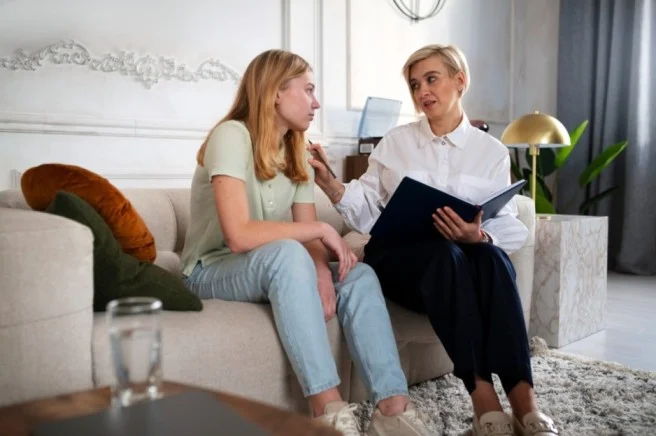Clinical For Mental Health Counseling Programs In Maryland
Looking for Maryland clinical mental health counseling programs? Discover the best CACREP-accredited programs, licensure process, and career path. Learn about how to become a licensed counselor and mental health treatment at The BGH Clinic for Women’s Health with specialty women of color therapy. Looking for a career as a counselor or professional mental health care? This guide contains everything you want to know. Get expert advice on programs, salaries, and FAQs. Begin your path to improved mental health today! Make an appointment with The BGH Clinic for individualized care.
The Dynamics of Clinical Mental Health Counseling in Maryland
Clinical mental health counseling is a vibrant and critical profession that involves diagnosing, treating, and counseling individuals who are facing diverse mental health issues. They also have a determining contribution to making people handle their mental and emotional health, with assistance in anxiousness, depressions, post-traumatic stresses, substance disorders, and traumatic problems. There are numerous education programs in Maryland that are numerous for training upcoming practitioners of mental care with the type of skills and training and qualification required to actually produce an efficacious effect on populations.
Clinical mental health counselors undergo rigorous training, including course work in human behavior, counseling techniques, ethics, and psychotherapy. They must also get supervised clinical experience to apply theoretical knowledge to real-life situations. Additionally, getting licensure is a mandatory prerequisite for practitioners wishing to practice on their own in Maryland. Most future counselors complete courses in accredited programs that include internships and field experiences in preparation for mental health professions in hospitals, private practice, and community organizations.
For women who seek high-quality mental health services, The BGH Clinic for Women’s Health offers specialized services to meet the unique needs of women of color. Individual therapy, group counseling, medication management, and treatment for race-based trauma, anxiety, PTSD, and other concerns are offered in the clinic. With compassionate and professional-focused care, The BGH Clinic empowers women to prioritize their mental health and seek professional help when they need it most.

Why Clinical Mental Health Counseling Matters in Maryland
Mental illness disorders affect millions of individuals around the country, affecting relationships, work performance, and overall wellness. In Maryland, there’s a high demand for mental health professionals since an increased awareness has developed about how critical mental wellness is and about how much more essential services have to be available. Clinical mental health counselors are the key workers that help patients learn coping abilities, increase emotional resilience, and regain control of their lives once again.
Counselors assist clients to work through their emotions, heal past traumas, and engage in constructive strategies for coping with stress and mental illness. Through the provision of guided sessions of therapy, such professionals provide people with the ability to withstand hardship, achieve personal goals, and build better relationships. The impact of mental health counseling goes well beyond the client—it makes families stronger, workplaces more efficient, and communities across the nation healthier by advancing mental wellness and ending stigma.
Maryland’s Best Clinical Mental Health Counseling Programs
Maryland boasts some of the nation’s best clinical mental health counseling programs, which are specifically tailored to equip prospective counselors with the required knowledge, skills, and hands-on training to work with individuals who have mental health problems. These programs concentrate on professional education in the methods of counseling, ethics, clinical evaluation, and therapeutic interventions so that graduates can successfully become licensed and practice. Below are three of Maryland’s top programs that provide great education and career prospects for future mental health professionals.
1. University of Maryland – Master’s in Clinical Counseling
Program Description: The University of Maryland boasts an established CACREP-accredited master’s degree in clinical mental health counseling. The program is focused on cultivating clinical skills, ethical ways of counseling, and therapeutic interventions for professional career development in counseling.
Key Features: The program includes experiential learning through internships, research, and supervised clinical training. The program also includes specialized courses in multicultural counseling, trauma-informed care, and behavioral health.
Career Opportunities: The program graduates are Licensed Clinical Professional Counselors (LCPCs) and find employment in hospitals, private practices, community mental health clinics, and rehabilitation centers.
2. Johns Hopkins University – Mental Health Counseling Program
Program Overview: Johns Hopkins University offers a liberal mental health counseling program that prepares students with school, health, and diverse mental health settings. The program emphasizes the basics of counseling theories, therapeutic interventions, and clinical assessment methods.
Key Features: The program consists of training in telehealth counseling, instruction in trauma-focused therapy, and specialized course work in evidence-based interventions. Students also perform supervised internships, ensuring they receive hands-on training before venturing into the industry.
Career Opportunities: The graduates can pursue various careers as school counselors, clinical therapists, mental health specialists, and rehabilitation program coordinators. Most of the graduates get employment in mental health centers, private practices, and non-profit agencies.
3. Loyola University Maryland – Clinical Professional Counseling Program
Program Overview: Loyola University Maryland offers a comprehensive clinical professional counseling program that aims to prepare students with mental health counseling, social work, and therapy profession skills. The program emphasizes a holistic approach to treating mental health through integrative therapy practices and evidence-based research.
Key Features: The course provides extensive training in multicultural counseling, ethical decision-making, and trauma-informed treatment. Students learn to apply skills and concepts through practicum training experiences in mental health centers, crisis intervention centers, and community agencies.
Career Opportunities: The majority of graduates seek employment in not-for-profit organizations, college counseling clinics, private practice, and government mental health agencies. The high level of focus on cultural competency and ethical practice in the program equips graduates to compete in the job market.
Services in The BGH Clinic for Women’s Health in Maryland
Apart from being a mental health counseling career, it is also important to note the services provided for women of color in need of mental health services. BGH Clinic for Women’s Health is dedicated to providing sensitive and culturally responsive mental health care and offering a range of services that are specifically designed to address the unique needs of clients. The main services provided by the clinic are as follows:
1. Individual Therapy
One-on-one, in-clinic therapy sessions are aimed at helping women navigate life’s challenges, including depression, anxiety, PTSD, relationship conflicts, self-esteem problems, and trauma. Sessions provide a safe space for women to disclose emotion, acquire coping skills, and increase resilience with the guidance of a state-certified mental health professional. Therapy is aimed at client empowerment through helping them set personal goals, acquire stress management, and again find mastery over mental wellness.
2. Group Therapy
BGH Clinic group therapy sessions allow women to comfortably share with others who have endured the same situations. Led by a therapist, the sessions tackle stress management, trauma recovery, self-esteem, and emotional healing. The best part of group therapy is the shared experience and peer support that can give individuals a sense of belonging and better mental outcomes. Women are assisted by the counseling of mental health workers as well as by one another’s histories in seeking healing.
3. Medication Management
For individuals requiring medical intervention for mental illness, The BGH Clinic provides professional medication management. Under this service, clients receive complete evaluation, prescription ongoing management, and close monitoring of psychiatric medication to ensure that clients get the best possible treatment. Clinic mental health practitioners work together with the clients in personalizing medicine routines based on their requirements in such a way that they achieve maximum wellness and minimal side effects.
4. Race-Related Trauma and Cultural Issues Support
The BGH Clinic is sensitive to the profound impact of race-related trauma, discrimination, and cultural stigmatization of mental illness. The clinic’s mental health providers are skilled at providing culturally competent therapy to assist women of color in navigating the complexities of their life experiences. Through a combination of therapy, counseling, and advocacy, The BGH Clinic creates a safe space where women feel listened to, seen, and respected along their mental health journey.
5. Whole-Person Treatment of Mental Health
In addition to classical treatment and medication management, The BGH Clinic also utilizes a whole-person treatment of mental health. These include individually tailored self-care exercises, stress-reduction exercises, and mindfulness. These are tailored individually according to the individual needs of each client.The focus here is to work towards overall mental, emotional, and physical well-being so that women can achieve a balance in everything in their life.

Steps to Becoming a Maryland Licensed Clinical Counselor
In order to become a Licensed Clinical Professional Counselor (LCPC) in Maryland, there are several important steps including education, supervised experience, exams, and licensure. Following is a step-by-step guide that guides potential counselors through the process:
1.Obtain a CACREP-Accredited Program
The initial requirement to become a licensed clinical counselor is receiving a master’s degree in clinical mental health counseling from an accredited CACREP program. The programs have comprehensive coursework in counseling skills, human development, ethics, and treatment of mental illness, which prepares the students adequately for clinical practice.
2. Comply with Internship and Supervised Experience Requirements
In order to become eligible for a license in Maryland, candidates need to acquire 3,000 hours of post-master’s clinical practice under supervision. Direct client counseling hours should not be less than 1,500 hours, which exposes the candidates to working on hands-on cases in real-world settings. The supervision should be done by an approved professional counselor, psychiatrist, psychologist, or social worker. Most graduates meet this requirement in mental health clinics, hospitals, rehabilitation centers, or private practices.
3. Pass the National Counselor Examination (NCE)
The National Counselor Examination (NCE) is a standardized test administered by the National Board for Certified Counselors (NBCC). It examines counseling theories, ethics, assessment, and intervention skills knowledge. A person has to pass the exam for Maryland licensure. Some candidates will also sit for the National Clinical Mental Health Counseling Examination (NCMHCE) depending on the requirements for licensure.
4. Apply for Maryland State Licensure
After education and exam necessities, candidates must submit an application for licensure to the Maryland Board of Professional Counselors and Therapists.The application requires verification of education, provision of evidence of supervised experience, and test results. The applicant is also required to conduct a criminal record check and provide the licensing fee. Candidates on approval are issued an LCPC to practice independently in the state.
5. Foster Professional Development
Maryland-licensed counselors must also remain current by taking continuing education (CE) credits. LCPCs are required under Maryland state law to earn 40 hours of continuing education every two years, including courses in ethics, diversity, and clinical interventions. Attending workshops, seminars, and additional certifications assists counselors in staying abreast of the latest research and best practices within the field.
Frequently Asked Questions (FAQs)
1. How long does it take to be a licensed clinical mental health counselor in Maryland?
Most programs take 2-3 years, plus two years of supervised experience before licensure.
2. What does a clinical mental health counselor in Maryland earn?
According to the U.S. Bureau of Labor Statistics, the average yearly salary is around $50,000 – $75,000, depending on experience and specialty.
3. Can one practice without a license in Maryland?
No, Maryland necessitates that all clinical mental health counselors be certified as a Licensed Clinical Professional Counselor (LCPC).
4. What type of therapy does The BGH Clinic offer?
We offer individual therapy, group therapy, and medication management for anxiety, PTSD, substance abuse, and more.
Conclusion
Maryland offers quality clinical mental health counseling programs for those who want a rewarding mental health career. In addition, for those who require mental health services, The BGH Clinic for Women’s Health provides comprehensive therapy services designed for women of color. Whether you require finding a mental health counseling career or professional mental health services, Maryland has the resources to help you every step of the way.For professional mental health services, book an appointment with The BGH Clinic today!



